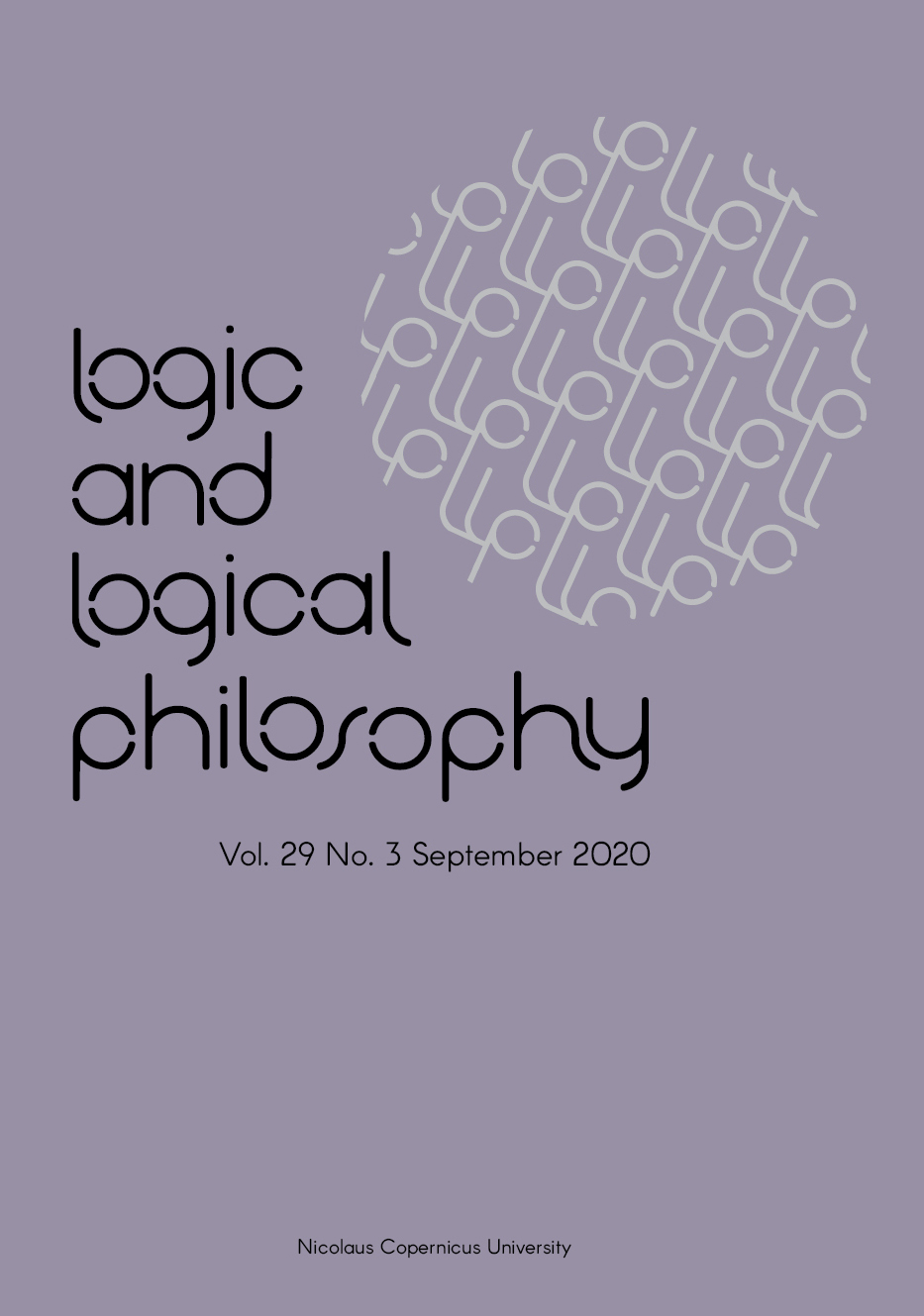Some Formal Semantics for Epistemic Modesty
DOI:
https://doi.org/10.12775/LLP.2020.002Keywords
belief, topology, bisimulation quantifiers, derived set, modesty, humility, KD45, formal epistemology, derivativeAbstract
Given the frequency of human error, it seems rational to believe that some of our own rational beliefs are false. This is the axiom of epistemic modesty. Unfortunately, using standard propositional quantification, and the usual relational semantics, this axiom is semantically inconsistent with a common logic for rational belief, namely KD45. Here we explore two alternative semantics for KD45 and the axiom of epistemic modesty. The first uses the usual relational semantics and bisimulation quantifiers. The second uses a topological semantics and standard propositional quantification. We show the two different semantics validate many of the same formulas, though we do not know whether they validate exactly the same formulas. Along the way we address various philosophical concerns.References
Aiello, M., I. Pratt-Hartmann, and J. van Benthem (eds.), 2007, Handbook of Spatial Logics, Springer, Dordrecht. DOI: http://dx.doi.org/10.1007/978-1-4020-5587-4
Antonelli, G.A., and R.H. Thomason, 2002, “Representability in second-order propositional poly-modal logic”, The Journal of Symbolic Logic 67: 1039–1054. DOI: http://dx.doi.org/10.2178/jsl/1190150147
Armstrong, D., 1974, Belief, Truth, and Knowledge, Cambridge University Press, Cambridge, Mass. DOI: http://dx.doi.org/10.1017/CBO9780511570827
Baltag, A., N. Bezhanishvili, A. Özgün, and S. Smets, 2019, “A topological approach to full belief”, Journal of Philosophical Logic 48 (2): 205-244. DOI: http://dx.doi.org/10.1007/s10992-018-9463-4
Boolos, G., 1993, The Logic Of Provability, Cambrdige University Press, Cambridge, Mass. DOI: http://dx.doi.org/10.1017/CBO9780511625183
Bull, R.A., 1969, “On modal logics with propositional quantifiers”, The Journal of Symbolic Logic 34: 257–263. DOI: http://dx.doi.org/10.2307/2271102
D’agostino, G., and G. Lenzi, 2005, “An axiomatization of bisimulation quantifiers via the µ-calculus”, Theoretical Computer Science 338: 64–95. DOI: http://dx.doi.org/10.1016/j.tcs.2004.10.040
Driver, J., 1989, “The virtues of ignorance”, The Journal of Philosophy 86: 373–384. DOI: http://dx.doi.org/10.2307/2027146
Evnine, S.J., 2001, Learning from one’s mistakes: epistemic modesty and the nature of belief”, Pacific Philosophical Quarterly 82: 157–177. DOI: http://dx.doi.org/10.1111/1468-0114.00123
Fine, K., 1970, “Propositional quantifiers in modal logic”, Theoria, 36: 336–346. DOI: http://dx.doi.org/10.1111/j.1755-2567.1970.tb00432.x
Flanagan, O., 1990, “Virtue and ignorance”, Journal of Philosophy, 87 (8): 420–428. DOI: http://dx.doi.org/10.2307/2026736
French, T., 2005, “Bisimulation quantified logics: undecidability”, pages 396–407 in S. Sarukkai and S. Sen (eds.), FSTTCS 2005: Foundations of Software Technology and Theoretical Computer Science, Lecture Notes in Computer Science, vol. 3821, Springer, Berlin, Heidelberg. DOI: http://dx.doi.org/10.1007/11590156_32
French, T., 2006a, “Bisimulation quantifiers for modal logic”, PhD thesis, University of Western Australia.
French, T. 2006b, “Bisimulation quantified modal logics: decidability”, Advances in Modal Logic 6: 147–166.
Gettier, E., 1963, “Is justified true belief knowledge?”, Analysis 23 (6): 121–123. DOI: http://dx.doi.org/10.1093/analys/23.6.121
Ghilardi, S., and M. Zawadowski, 1995, “Undefinability of propositional quantifiers in the modal system S4”, Studia Logica 55: 259–271. DOI: http://dx.doi.org/10.1007/BF01061237
Goldblatt, R., 1992, Logics of Time and Computation, 2nd Edition, CSLI Lecture Notes no. 7.
Grim, P., 1991, The Incomplete Universe, MIT Press, Cambridge, Mass.
Kaplan, D., 1970, “S5 with quantifiable propositional variables”, The Journal of Symbolic Logic 35 (2): 355.
Kuhn, S., 2004, “A simple embedding of T into double S5”, Notre Dame Journal of Formal Logic 45 (1): 13–18. DOI: http://dx.doi.org/10.1305/ndjfl/1094155276
Levin, M, 2006, “Gettier cases without false lemmas?”, Erkenntnis 65 (3): 381–392. DOI: http://dx.doi.org/10.1007/s10670-005-5470-2
MacIntosh, J.J., 1980, “An extension of a proof of Prior’s or when thinking makes it so”, Analysis 40 (2): 86–89. DOI: http://dx.doi.org/10.2307/3327417
McKinsey, J.C.C., 1941, “A solution of the decision problem for the Lewis systems S2 and S4, with an application to topology”, The Journal of Symbolic Logic 6 (4): 117–134. DOI: http://dx.doi.org/10.2307/2267105
McKinsey, J.C.C., and A. Tarski, 1944, “The algebra of topology”, Annals of Mathematics 45: 141–191. DOI: http://dx.doi.org/10.2307/1969080
McKinsey, J.C.C., and A. Tarski, 1948, “Some theorems about the sentential calculi of Lewis and Heyting”, Journal Of Symbolic Logic 13: 1–15. DOI: http://dx.doi.org/10.2307/2268135
Pitts, A.M., 1992, “On an interpretation of second order quantification in first order intuitionistic propositional logic”, The Journal of Symbolic Logic 57: 33–52. DOI: http://dx.doi.org/10.2307/2275175
Prior, A.N., 1971, Objects of Thought, Clarendon, Oxford, DOI: http://dx.doi.org/10.1093/acprof:oso/9780198243540.001.0001
Richards, N., 1992, Humility, Temple University Press, Philadelphia.
Schulz, K., 2010, Being Wrong: Adventures in the Margin of Error, Ecco, New York.
Stalnaker, R., 2006, “On logics of knowledge and belief”, Philosophical Studies 128 (1): 169–199. DOI: http://dx.doi.org/10.1007/s11098-005-4062-y
Steinsvold, C., 2003, “Towards a topology of knowledge and belief”, Talk given at the Workshop on Reasoning about Space, during the NASSLI conference, Bloomington, Indiana.
Steinsvold, C., 2007, “Topological models of belief logics”, PhD thesis, CUNY GSUC, New York, NY.
Steinsvold, C., 2008, “A grim semantics for logics of belief”, The Journal of Philosophical Logic 37 (1): 45–56. DOI: http://dx.doi.org/10.1007/s10992-007-9055-1
Tsao-Chen, T., 1938, “Algebraic postulates and a geometric interpretation for the Lewis calculus of strict implication”, Bulletin of the American Mathematical Society 44: 737–744. DOI: http://dx.doi.org/10.1090/S0002-9904-1938-06860-7
Visser, A., 1996, “Uniform interpolation and layered bisimulation”, pages 139–164 in P. Hájek (ed.), Gödel’96, Logical Foundations of Mathematics, Computer Science and Physics – Kurt Gödel’s Legacy, Springer, Berlin. DOI: http://dx.doi.org/10.1017/9781316716939.010
Downloads
Published
How to Cite
Issue
Section
Stats
Number of views and downloads: 607
Number of citations: 0







